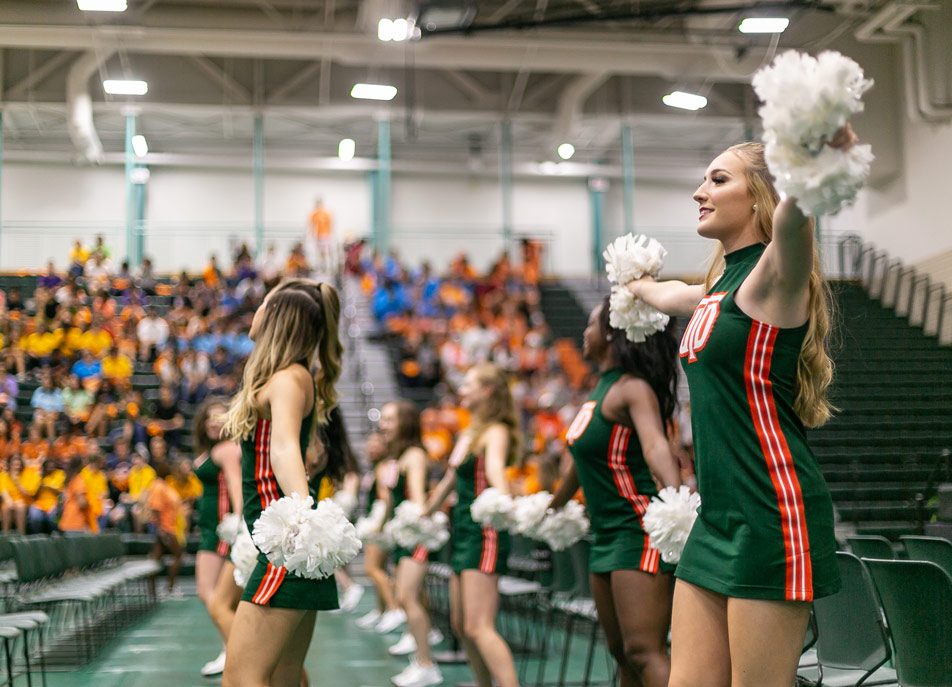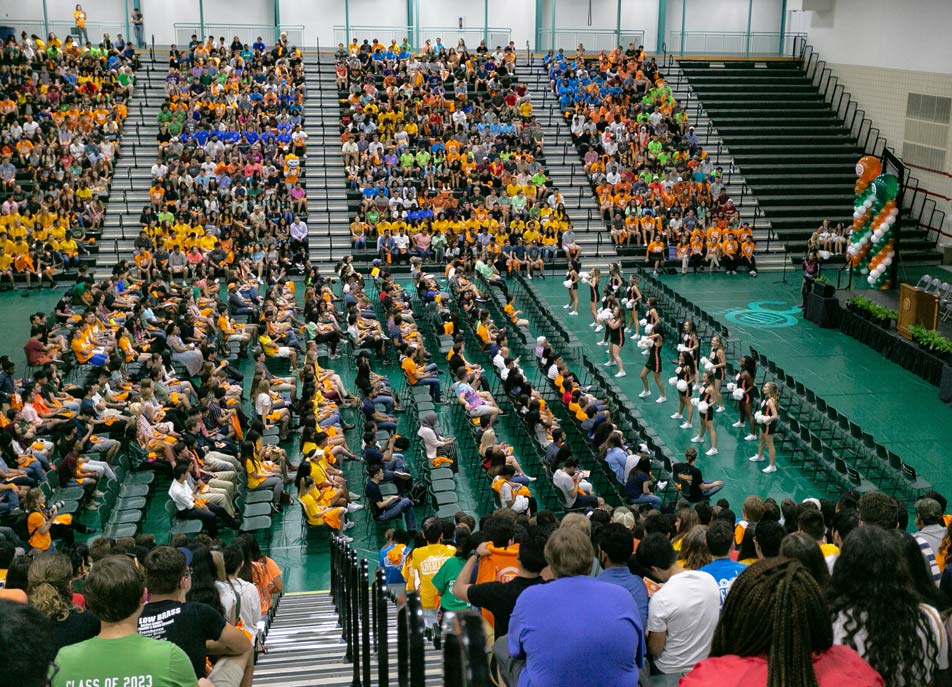Convocation Welcomes Students, Kicks Off 50th Anniversary Celebration
By: Stephen Fontenot | Sept. 3, 2019
As a crowd of nearly 2,000 filed into the Activity Center for Convocation last month, many of the sights and sounds that filled the gymnasium suggested an academic year beginning like many before it.
New University of Texas at Dallas students gathered to learn about Comet traditions and programs, listen to the “UT Dallas Alma Mater” and falteringly attempt their first few Whooshes. Yet the signs that something more was being commemorated were not hard to find.
With a backdrop of screens, T-shirts and swirling spotlights adorned with a logo marking the University’s 50 years, UT Dallas officially kicked off its anniversary celebration at Convocation — the first of several events, including a symphony orchestra concert in May, that will highlight the milestone throughout the academic year.
During Convocation, new students were greeted with a video timeline of the University’s history. And with each incoming cohort, UT Dallas’ population and profile have reached new heights.
“Our University is still young,” said President Richard C. Benson, who holds the Eugene McDermott Distinguished University Chair of Leadership. “It has a strong foundation in the STEM disciplines, business, and, increasingly, the arts. But like institutions around the world, technology has brought changes over the years: new approaches to design, new methods to solve problems, and new influences in music and art.”
“Just like you, I made a choice to come to UT Dallas — not as a student, obviously, but my reasons are probably very similar to yours. The excellent faculty, the diverse student body, the innovative programs, the strong research emphasis, the beautiful campus and the ability to help shape this young University.”
UT Dallas President Richard C. Benson, addressing students at Convocation
Benson drew a parallel between the factors that led many students to choose UT Dallas for their education and the qualities that he saw when electing in 2016 to take the top job at what he described as “one of the most exciting institutions in the nation.”
“Just like you, I made a choice to come to UT Dallas — not as a student, obviously, but my reasons are probably very similar to yours,” he said. “The excellent faculty, the diverse student body, the innovative programs, the strong research emphasis, the beautiful campus and the ability to help shape this young University.”
Dr. Inga Musselman, provost and vice president for academic affairs, guided the ceremony, noting the wide range of points of origin for the University’s new arrivals.
“Your choice to attend UT Dallas demonstrates that you are comfortable with innovation and change,” she said. “Only two important questions remain: How will you be changed by becoming a Comet? And how will you choose to change this community?”
Musselman outlined UT Dallas’ meteoric growth by comparing current University statistics to those from only a decade-and-a-half ago.
“Fifteen years ago, we had slightly over 10,000 students and a little over 250 tenured and tenure-track faculty. UT Dallas was small by many standards,” she said. “Fast-forward to today; we have approximately 29,000 students, about 560 tenured and tenure-track faculty, and a significantly increased physical facility.”
Political science master’s student Jude Celiscar, whose entrepreneurial efforts to help his home nation of Haiti have drawn the attention of Forbes magazine, emphasized that new Comets should learn quickly to “call on each other when you need to.”
“This is the first principle of community: We are here to support each other and to celebrate the successes of each other,” he said in his address to transfer students. “I also want you to know that you should be the change you want to see in this community. If you see something that could have been done better, come to the table, start or join a student organization to advocate for that change.”
Just before students poured out of the Activity Center and headed to the Welcome Back Bash that opened the annual Weeks of Welcome, biomedical engineering PhD student Kara Peak provided what she called “the rundown on Grad Life 101,” stressing the importance of work-life balance in her remarks to new graduate students.
“While we are all eager to graduate and get out in the ‘real world,’” she said, “there will not be another experience like this.”
Media Contact: Stephen Fontenot, UT Dallas, 972-883-4405, stephen.fontenot@utdallas.edu, or the Office of Media Relations, UT Dallas, (972) 883-2155, newscenter@utdallas.edu.














